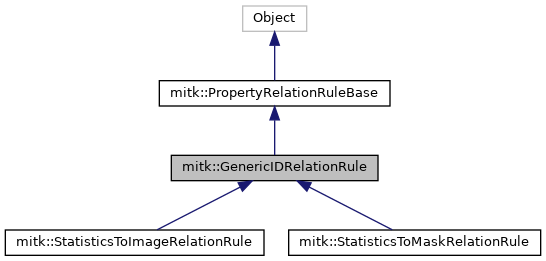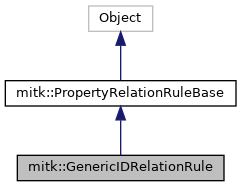#include <mitkGenericIDRelationRule.h>


Public Types | |
| typedef GenericIDRelationRule | Self |
| typedef PropertyRelationRuleBase | Superclass |
| typedef itk::SmartPointer< Self > | Pointer |
| typedef itk::SmartPointer< const Self > | ConstPointer |
| using | RuleIDType = PropertyRelationRuleBase::RuleIDType |
| using | RelationUIDType = PropertyRelationRuleBase::RelationUIDType |
| using | RelationUIDVectorType = PropertyRelationRuleBase::RelationUIDVectorType |
 Public Types inherited from mitk::PropertyRelationRuleBase Public Types inherited from mitk::PropertyRelationRuleBase | |
| enum | RelationType { RelationType::None, RelationType::Data, RelationType::ID, RelationType::Complete } |
| typedef PropertyRelationRuleBase | Self |
| typedef itk::Object | Superclass |
| typedef itk::SmartPointer< Self > | Pointer |
| typedef itk::SmartPointer< const Self > | ConstPointer |
| using | RuleIDType = std::string |
| using | RelationUIDType = Identifiable::UIDType |
| using | RelationUIDVectorType = std::vector< RelationUIDType > |
| using | RelationVectorType = std::vector< RelationType > |
| using | InstanceIDType = std::string |
Static Public Member Functions | |
| static const char * | GetStaticNameOfClass () |
| static Pointer | New (const RuleIDType &_arg) |
| static Pointer | New (const RuleIDType &_arga, const std::string &_argb) |
| static Pointer | New (const RuleIDType &_arga, const std::string &_argb, const std::string &_argc, const std::string &_argd) |
 Static Public Member Functions inherited from mitk::PropertyRelationRuleBase Static Public Member Functions inherited from mitk::PropertyRelationRuleBase | |
| static const char * | GetStaticNameOfClass () |
| static PropertyKeyPath | GetRootKeyPath () |
| static PropertyKeyPath | GetRIIPropertyKeyPath (const std::string propName, const InstanceIDType &instanceID) |
| static PropertyKeyPath | GetRIIRelationUIDPropertyKeyPath (const InstanceIDType &instanceID="") |
| static PropertyKeyPath | GetRIIRuleIDPropertyKeyPath (const InstanceIDType &instanceID="") |
| static PropertyKeyPath | GetRIIDestinationUIDPropertyKeyPath (const InstanceIDType &instanceID="") |
Protected Types | |
| using | InstanceIDType = PropertyRelationRuleBase::InstanceIDType |
| using | InstanceIDVectorType = PropertyRelationRuleBase::InstanceIDVectorType |
| using | DataRelationUIDVectorType = PropertyRelationRuleBase::DataRelationUIDVectorType |
 Protected Types inherited from mitk::PropertyRelationRuleBase Protected Types inherited from mitk::PropertyRelationRuleBase | |
| using | InstanceIDVectorType = std::vector< InstanceIDType > |
| using | DataRelationUIDVectorType = std::vector< std::pair< RelationUIDType, RuleIDType > > |
Protected Member Functions | |
| GenericIDRelationRule (const RuleIDType &ruleIDTag) | |
| GenericIDRelationRule (const RuleIDType &ruleIDTag, const std::string &displayName) | |
| GenericIDRelationRule (const RuleIDType &ruleIDTag, const std::string &displayName, const std::string &sourceRole, const std::string &destinationRole) | |
| ~GenericIDRelationRule () override=default | |
| DataRelationUIDVectorType | GetRelationUIDs_DataLayer (const IPropertyProvider *source, const IPropertyProvider *destination, const InstanceIDVectorType &instances_IDLayer) const override |
| void | Connect_datalayer (IPropertyOwner *source, const IPropertyProvider *destination, const InstanceIDType &instanceID) const override |
| void | Disconnect_datalayer (IPropertyOwner *source, const RelationUIDType &relationUID) const override |
| bool | IsSupportedRuleID (const RuleIDType &ruleID) const override |
| itk::LightObject::Pointer | InternalClone () const override |
 Protected Member Functions inherited from mitk::PropertyRelationRuleBase Protected Member Functions inherited from mitk::PropertyRelationRuleBase | |
| PropertyRelationRuleBase ()=default | |
| ~PropertyRelationRuleBase () override=default | |
| InstanceIDVectorType | GetInstanceID_IDLayer (const IPropertyProvider *source, const IPropertyProvider *destination) const |
| RelationUIDType | GetRelationUIDByInstanceID (const IPropertyProvider *source, const InstanceIDType &instanceID) const |
| InstanceIDType | GetInstanceIDByRelationUID (const IPropertyProvider *source, const RelationUIDType &relationUID) const |
| RelationUIDType | Connect (IPropertyOwner *source, const IPropertyProvider *destination) const |
| std::string | GetRIIPropertyRegEx (const std::string propName="", const InstanceIDType &instanceID="") const |
| RuleIDType | GetRuleIDByInstanceID (const IPropertyProvider *source, const InstanceIDType &instanceID) const |
| std::string | GetDestinationUIDByInstanceID (const IPropertyProvider *source, const InstanceIDType &instanceID) const |
| itk::LightObject::Pointer | InternalClone () const override |
| const Identifiable * | CastProviderAsIdentifiable (const mitk::IPropertyProvider *provider) const |
Additional Inherited Members | |
 Static Protected Member Functions inherited from mitk::PropertyRelationRuleBase Static Protected Member Functions inherited from mitk::PropertyRelationRuleBase | |
| static InstanceIDType | NULL_INSTANCE_ID () |
| static InstanceIDType | GetInstanceIDByPropertyName (const std::string propName) |
| static std::vector< std::string > | GetPropertyKeys (const IPropertyProvider *owner) |
Detailed Description
This rule class can be used for relations that are only defined on the ID-layer and where no connection on the Data-layer can be defined or deduced. So it can be used for all ID based relations between PropertyProviders that also implement the interface identifiable. In order to be able to use this class for different relation types based on ID, the ruleIDTag is used. It must be specified when creating a rule instance. The ruleIDTag will be used as suffix for the rule ID of the instance and therefore allows to create specific and distinguishable rules instances based on this class. One may also specify the display name and the role names of the instance. If not specified, the default values are used (display name: "<ruleIDTag> relation", source role name: "source of <ruleIDTag> relation", destination role name: "destination <ruleIDTag> of relation")
Definition at line 32 of file mitkGenericIDRelationRule.h.
Member Typedef Documentation
◆ ConstPointer
| typedef itk::SmartPointer<const Self> mitk::GenericIDRelationRule::ConstPointer |
Definition at line 35 of file mitkGenericIDRelationRule.h.
◆ DataRelationUIDVectorType
|
protected |
Definition at line 75 of file mitkGenericIDRelationRule.h.
◆ InstanceIDType
|
protected |
Definition at line 72 of file mitkGenericIDRelationRule.h.
◆ InstanceIDVectorType
|
protected |
Definition at line 73 of file mitkGenericIDRelationRule.h.
◆ Pointer
Definition at line 35 of file mitkGenericIDRelationRule.h.
◆ RelationUIDType
Definition at line 42 of file mitkGenericIDRelationRule.h.
◆ RelationUIDVectorType
| using mitk::GenericIDRelationRule::RelationUIDVectorType = PropertyRelationRuleBase::RelationUIDVectorType |
Definition at line 43 of file mitkGenericIDRelationRule.h.
◆ RuleIDType
Definition at line 41 of file mitkGenericIDRelationRule.h.
◆ Self
Definition at line 35 of file mitkGenericIDRelationRule.h.
◆ Superclass
Definition at line 35 of file mitkGenericIDRelationRule.h.
Constructor & Destructor Documentation
◆ GenericIDRelationRule() [1/3]
|
protected |
◆ GenericIDRelationRule() [2/3]
|
protected |
◆ GenericIDRelationRule() [3/3]
|
protected |
◆ ~GenericIDRelationRule()
|
overrideprotecteddefault |
Member Function Documentation
◆ Clone()
| Pointer mitk::GenericIDRelationRule::Clone | ( | ) | const |
◆ Connect()
| RelationUIDType mitk::GenericIDRelationRule::Connect | ( | IPropertyOwner * | source, |
| const IPropertyProvider * | destination | ||
| ) | const |
Pass through to base implementation of PropertyRelationRuleBase. See PropertyRelationRuleBase::connect documentation for more information.
◆ Connect_datalayer()
|
overrideprotectedvirtual |
Is called by Connect() to ensure that source has correctly set properties to resemble the relation on the data layer. This means that the method should set the properties that describe and encode the relation on the data layer (data-layer-specific relation properties). If the passed instance are already connected, the old settings should be overwritten. Connect() will ensure that source and destination are valid pointers.
- Parameters
-
source destination instanceID is the ID for the relation instance that should be connected. Existence of the relation instance is ensured.
- Precondition
- source must be a valid instance.
- destination must be a valid instance.
Implements mitk::PropertyRelationRuleBase.
◆ Disconnect_datalayer()
|
overrideprotectedvirtual |
This method is called by Disconnect() to remove all properties of the relation from the source that are set by Connect_datalayer().
- Remarks
- This method should remove all properties that are set for a specific relation by Connect_datalayer(...). If the relationUID is not part of the source, nothing will be changed. Disconnect() ensures that source is a valid pointer if called.
- Disconnect() ensures that source is valid and only invokes if instance exists.
Implements mitk::PropertyRelationRuleBase.
◆ GetClassHierarchy()
|
inlineoverridevirtual |
Reimplemented from mitk::PropertyRelationRuleBase.
Definition at line 35 of file mitkGenericIDRelationRule.h.
◆ GetClassName()
|
virtual |
Reimplemented from mitk::PropertyRelationRuleBase.
◆ GetDestinationRoleName()
|
overridevirtual |
Returns a human readable string that can be used to describe the role of a destination in context of the rule instance.
Implements mitk::PropertyRelationRuleBase.
◆ GetDisplayName()
|
overridevirtual |
Returns a human readable string that can be used to describe the rule. Does not need to be unique.
Implements mitk::PropertyRelationRuleBase.
◆ GetRelationUIDs_DataLayer()
|
overrideprotectedvirtual |
Returns the RelationUIDs of all relations that are defined by the data layer of source for this rule instance and, if defined, destination. If the passed source (and destination) instance has no relation on the data layer, an empty vector will be returned.
- Remarks
- Per definition for property relation rules only 0 or 1 instance should be found for one provider pair and concrete rule. But there might be more then one instance because either 1) the rule is abstract and supports multiple rule IDs or 2) the data layer may be ambiguous (e.g. because the destination was not specified) and therefore multiple relation instances of the rule instance could match. The implementation of this function should report all relation instances. The calling function will take care.
- Parameters
-
source destination Destination the find relations should point to. If destination is NULL any relation on the data layer for this rule and source are wanted. instances_IDLayer List of relation instances that are already defined by the ID layer. The implementation of this function should only cover relations that are not already resembled in the passed relarions_IDLayer.
- Precondition
- source must be a pointer to a valid IPropertyProvider instance.
Implements mitk::PropertyRelationRuleBase.
◆ GetRuleID()
|
overridevirtual |
Returns an ID string that identifies the rule class
Implements mitk::PropertyRelationRuleBase.
◆ GetSourceRoleName()
|
overridevirtual |
Returns a human readable string that can be used to describe the role of a source in context of the rule instance.
Implements mitk::PropertyRelationRuleBase.
◆ GetStaticNameOfClass()
|
inlinestatic |
Definition at line 35 of file mitkGenericIDRelationRule.h.
◆ InternalClone()
|
overrideprotected |
◆ IsAbstract()
|
overridevirtual |
Returns if the instance is a abstract rule (true). Default implementation is true. Overwrite and reimplement if another behavior is needed.
Reimplemented from mitk::PropertyRelationRuleBase.
◆ IsSupportedRuleID()
|
overrideprotectedvirtual |
Returns if the passed rule ID is supported/relevant for the rule. Either because it is the very ID of the rule (default implementation) or because it is an abstract rule which also supports the rule ID.
- Returns
- true: If the rule ID can handle the rule ID. false: the rule does not support the rule ID.
Reimplemented from mitk::PropertyRelationRuleBase.
◆ New() [1/3]
|
inlinestatic |
Definition at line 37 of file mitkGenericIDRelationRule.h.
◆ New() [2/3]
|
inlinestatic |
Definition at line 38 of file mitkGenericIDRelationRule.h.
◆ New() [3/3]
|
inlinestatic |
Definition at line 39 of file mitkGenericIDRelationRule.h.
The documentation for this class was generated from the following file:
